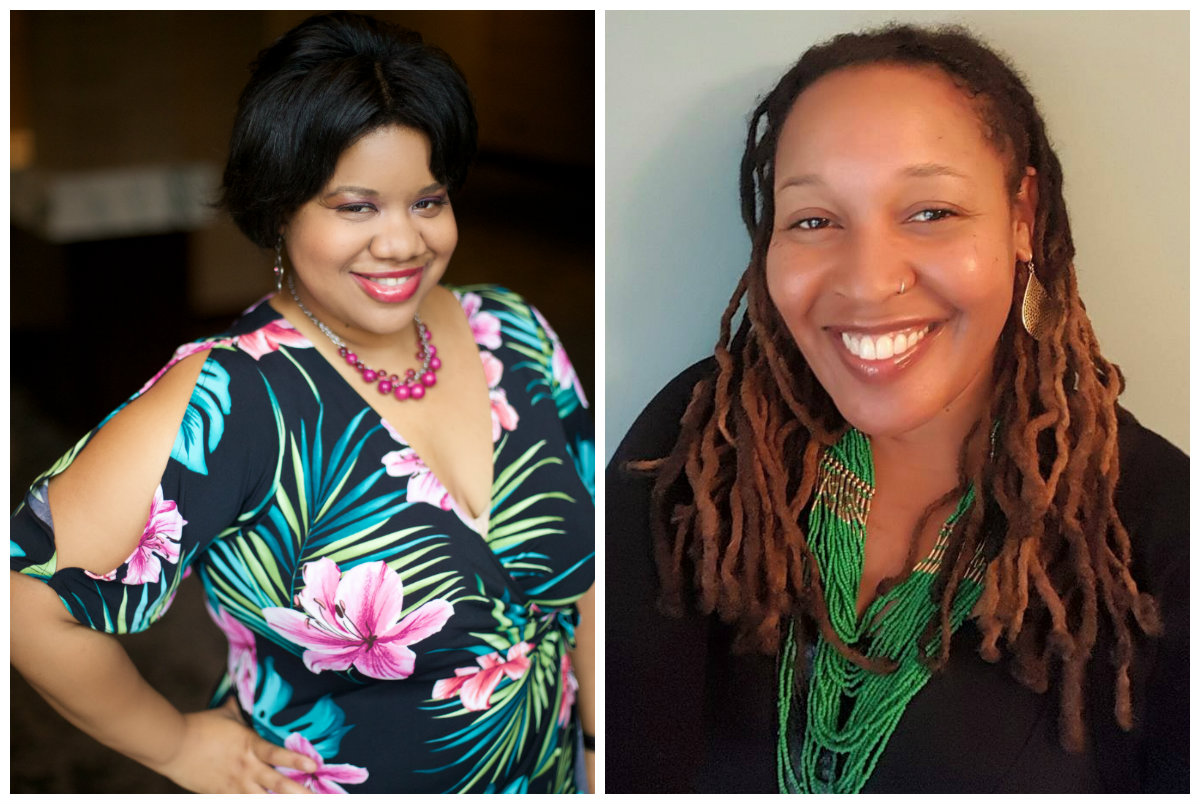Tiffany English tried four different coworking spaces before she realized that the co-ed office setup just didn’t work for her. The community marketing manager for Coalition Impact and founder of Velvetstyle says the tech-oriented “bro” culture felt isolating.
So she persuaded—or, as English jokingly puts it, twisted the arm of—Karen Hawkins, founder of Chicago’s Rebellious Magazine, to create Ladies Room Chicago, a women-only coworking space inside Coalition Impact (405 W. Superior St., River North). It joins the trend of similar offices opening in New York, Missouri, and California; English and Hawkins intend to gauge interest at this pop-up space through December, then find a permanent location by the end of the year.
Ladies Room Chicago can hold up to 15 people, and women and gender-nonconforming individuals are welcome, Hawkins says. Aside from ordinary gray tables, black office chairs, and a metal bar cart full of snacks, you’ll also find little feminine touches like a stack of free Orchidea Organic tampons and a framed calligraphy card that reads, “Nevertheless, she persisted.” Memberships range from $20 for a day pass to $650 for a three-month premium pass.
Chicago spoke with Hawkins and English about how Ladies Room Chicago stands out from its co-ed competitors, what they want in a permanent office, and why women-only spaces are necessary.
How did Ladies Room Chicago get its name?
Karen Hawkins: I’m just really good at naming things! I pitched the idea of “Ladies Room Chicago” and [English] eventually came around to it.
Tiffany English: She said, “The Ladies Room.” I said, “No, That’s the restroom. We’re not going to affiliate ourselves with that.” It grew on me. The ladies room, the parlor room or lounge area where you’re actually chatting… I want that feel to be what this community is about.
K.H.: What the ladies room has meant to me in other professional environments, that’s the place where you walk in and cry. If you have a bad interaction with a boss or a source yells at you, that’s where you go, “It’s going to be all right. You’re safe in here.” It’s a safe environment for you to let it out.
What is it about traditional coworking spaces that is isolating for women or women of color?
K.H.: You walk in and you don’t see anyone who looks like you. Or you do, but you don’t know if you’re allowed to talk to them, because nobody’s talking to you. And you think, “Eh, these are not my people.”
T.E.: My business was always a social type of business. Different co-working spaces tend to lean toward independent tech businesses: people on their laptops, with their headphones on, zoned in. So often I would meet people or try to connect and introduce myself in the kitchen area over coffee. And it was always this awkward, “Hey, nice day today! You like cream and sugar?” [Hawkins laughs] You didn’t really know how to start or engage. It was always like that first day of school. There were these established businesses, with established teams, so they talk within their teams. They don’t know if you’re here for the day or the week, so they may not even really want to interact and engage with you.
What made you realize that a space like Ladies Room Chicago was needed in Chicago?
T.E.: Women tend to work, network, and socialize differently when they're in a co-ed environment. At one space I was getting onto the elevator and a girl looks at me and I look at her, and she said, “Nice shoes!” I said, “Nice scarf!” We were so excited, because we just acknowledged each other. Some bros—they won’t talk to you. It was that moment where I realized maybe some women wanted to have that environment. You can still work alone. You can still get work done, but still have some time to be like, “Hey, let's talk,” or “That’s great.” And be in that environment where it feels authentic.
What resources do you offer now (or will offer in the future) for your members?
K.H.: We had an open house last week. We’re having a business card party where you bring your stack of business cards with you. We’re going to have feminist trivia. We want to know what kind of events people want to have.
T.E.: We all go to these networking events, but you want to have events that people look forward to going to instead of, “Ugh. I have to go to this.” With our events, because they're small and intimate, you don’t feel overwhelmed by getting up and doing your 30-minute pitch.
K.H.: Our dream is to have a truly women-driven coworking space. It’s got nursing rooms. It has on-site daycare. It has flexible hours. It has all of those wonderful things that women need that traditional spaces opened by dudes don’t have because they don’t understand that we need them. Down the road, that is the dream.
Ladies Room Chicago is part of a trend of women-only co-working spaces. What do you think is driving that trend?
T.E.: It’s the same as why there are women-only organizations or events. It was just a matter of time. We’re not anti-male. I just think that it’s a natural transition to have a women-only workspace. You have a women-only gym. You have professional women's networking events. You start to see the type of environment that’s open, that’s welcoming, that feels good. So why can’t that translate to your workspace?



